Introduction
Tunisian Interim President Moncef Marzouki is facing strong criticism in the country. Marzouki, nicknamed "Tartour" (in Arabic "insignificant," indicating someone who can be pushed in any direction), is accused of backing down on human rights issues in order to maintain the status quo with the El-Nahda Islamist party, which holds a relative majority that it won in the 2011 Tunisian elections. He is also accused of having evolved from a defender of human rights to the champion of Qatar – a country viewed by Tunisia's secular opposition as El-Nahda's main financier and as a supporter of Islamism in the country. 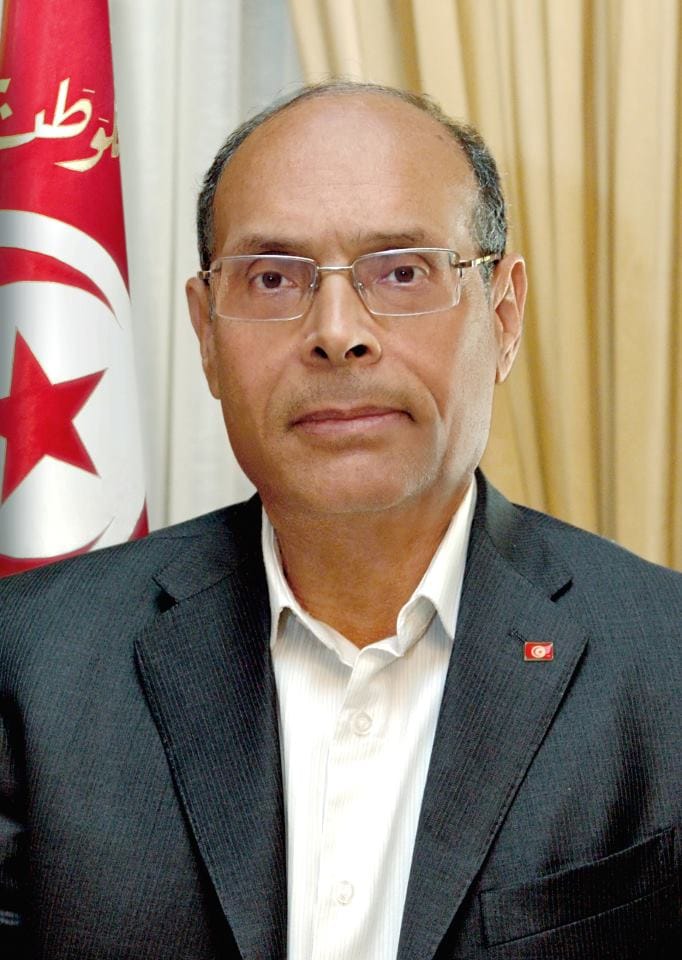 Interim President Moncef Marzouki[1] Marzouki, who refers to the secular opposition in the country as "secular extremists," stirred up controversy when, in an April 11, 2013 speech, he warned the Tunisian people not to insult Qatar.[2] He said that anyone who dares to do so will be accountable first to his own conscience and then before the law.[3] A Facebook page called "The Campaign to Insult the State of Qatar"[4] was created shortly after Marzouki's speech, and as of this writing has over 32, 400 members; posts on the page offer a broad range of jokes and insults.[5]  Tunisian protesters hold signs saying "Qatar, go away!"[6] Following his threat to anyone insulting Qatar, a petition demanding a hearing on Marzouki's performance, signed by 77 MPs, was submitted to the chairman of Tunisia's Constituent Assembly. The signatories belong to various parliamentary groups, but none are from El-Nahda, Marzouki's Congress for the Republic (CpR) party, or the Wafa movement.[7] Subsequently, on April 16, 2013, a motion for Marzouki's dismissal was filed with the Constituent Assembly registry.[8] Marzouki And The "Secular Extremists" On March 25, 2013, in an interview with the Qatari TV channel Al-Jazeera,[9] Interim President Moncef Marzouki said that if "secular extremists" gain power through a coup, the people will "start a revolution that will send them to the gallows. Calling these "secular extremists" blind in their judgment, he said that they do not understand that in order to maintain the status quo, they must learn the art of compromise. Marzouki's statements followed March 16 remarks by Popular Front leader Hamma Al-Hammami, who at a ceremony marking the 40th day since the assassination of political opposition leader and coordinator of the left-wing Tunisian Democratic Patriots' Movement Chokri Belaid[10] said that the Tunisians who brought down the dictator Zine Al-Abidine Ben Ali could also remove the current government.[11] Marzouki's statements immediately sparked harsh criticism in Tunisia against him – not only for his "gallows" comments but also for labeling Tunisian seculars "extremists." The secretary-general of the liberal Nidaa Tounes party, Taieb Baccouche, said that these remarks "encouraged sedition."[12] A March 26 article published by the Tunisian media outlet Kapitalis stated:[13] "'[If] secular extremists take power [in Tunisia] by means of a coup, they will face a revolution that will send them to the gallows.' "This declaration was made not by a religious extremist or by some religious Wahhabi network from the Gulf, but by the so-called 'secular' Moncef Marzouki, the (fortunately) transitional president of the Tunisian republic. "Moncef Marzouki, who was interviewed by Al-Jazeera TV as part of the 'Fil Omq' ("In Depth") program, added: "This revolution will be pitiless to them [the secularists], because there will be no reasonable individuals such as [Ettakatol leader and president of the Constituent Assembly of Tunisia] Mustapha Ben Jaâfar, Moncef Marzouki, or [El-Nahda leader] Rached Ghannouchi to call for dialogue, moderation, and national reconciliation."  Top: "Finally, Marzouki responds! Against the danger of the Secular Extremists!" Below: El-Nahda party leader Rached Gannouchi holds nooses for Tunisian secularists, who demonstrate with a sign saying "Down With ZabAllah"[14]; and marionette strings for Marzouki, who shouts "You will all hang!" Cartoonist: Tunisian cartoonist _Z_[15] Marzouki's Book And His "Decaying" Popularity In April 2003, Marzouki’s published his book L'invention d'une démocratie; les leçons de l'expérience tunisienne ("The invention of a democracy; The Lessons of the Tunisian Experience") was released by the French publisher Discovery. It sparked instant controversy because Marzouki had chosen a French publisher, Discovery, instead of a Tunisian one. In a message posted and circulated on social networks, the Tunisian publisher Art Libris stated: "Boycott Marzouki's latest book, published in France, in total disregard of the Tunisian publishers. Unacceptable! Do not be complicit in this anti-national act committed by the alleged Tunisian head of state."[16] However, an article titled "The Invention Of A President, The Illusion Of A Democracy," in the Tunisian media outlet Business News,[17] noted that Tunisians are reproaching Marzouki not for "'having wasted [so much of] the time of his presidential mandate' by writing a 180-page book, but basically for the way in which the image of a [former] opponent was severely sullied by his exercise of power. It is that same image that Marzouki, in his book, is trying to rekindle." The following are excerpts from the article, which was authored by journalist Synda Tajine: 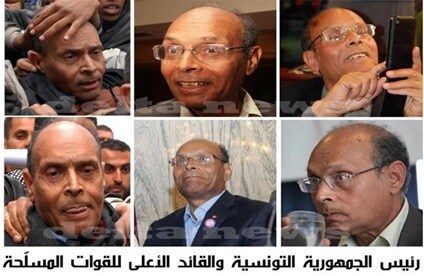 "President of the Tunisian Republic and Commander in Chief of the Armed Forces" – Photos of Marzouki circulated on social networks, with claims that he doesn't look very intelligent.[18] "'This books talks about my determination, as a Tunisian citizen who became president and also as an opponent [to the Ben Ali regime] who had to go though prison and exile before entering Carthage Palace, to participate in the creation of a democracy of the XXI century' – so states the conclusion of the introductory note of Marzouki's book. 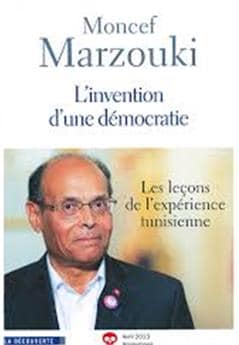 Cover of Marzouki's book "The decaying popularity of the president of the republic affected the sort of welcome that Tunisians living in France reserved [for him] on the occasion of the presentation of his book, in Paris, on April 12. However, what Tunisians are reproaching Marzouki for is not 'having wasted [so much of] the time of his presidential mandate' by writing a 180-page book, but basically for the way in which the image of a [former] opponent was severely sullied by his exercise of power. It is that same image that Marzouki, in his book, is trying to rekindle. His essay has overtones which are both autobiographic and pre-electoral. 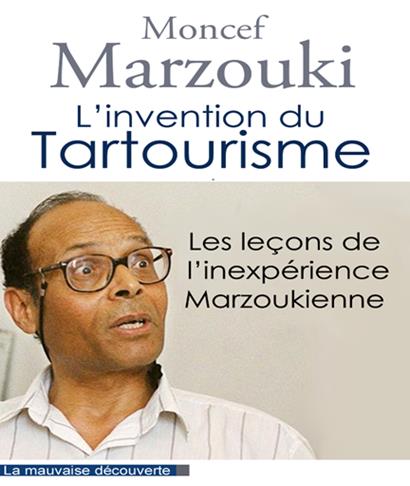 "Moncef Marzouki, the invention of 'Tartourisme' – Lessons from Marzouki's inexperience."[19] Cover of a 12-page e-book criticizing Marzouki. "...Thoughtless and unreasonable decisions are at the core of the portrait of a president as presented in the book, in which he tried to depict himself as somebody very 'particular.' The book has autobiographic overtones, and Marzouki, whose popularity is moribund, tries to revive [his] image as the human rights advocate and opponent of the Ben Ali regime that he once was – an image now buried under his presidential burnoose. This book, which can be considered a farewell from a president who is about to die politically, is a complete deception, from the very first pages. Words like 'political activism,' 'implication,' 'militancy,' and 'human rights advocacy' are scattered throughout the 180 pages of this work, in which Marzouki appears to be a sort of 'president-savior' for Tunisia, inspired by figures such as Mandela, Nasser or Gandhi. 'I am trying to be a bridge inside a divided society,' he says. However, while providing no explanation concerning the problems that today affect the country, Marzouki hopes that Tunisia will evolve politically like Christian Democracy did in Europe during the 1960s – and nothing less! "In this essay, which could easily be mistaken for the draft of an election platform, the man [Marzouki] justifies his 'inaction,' saying that it [actually] shows that he is determined to do good things. But since he is unable to show results, Marzouki presents a number of solutions that might facilitate the democratic transition... "But this book was also an unexpected opportunity for Marzouki to justify himself for all the numerous bad decisions for which he is reproached. In defending his alliance with El-Nahda, he implicitly presents 'political Islam' as the only alternative for the Arab people to rid themselves of the widespread idea that they are 'unfit to live in a democracy.' "The differences [between his personal opinions and] the El-Nahda party, according to Marzouki, can be summed up in four essential points: "1.Equality between men and women "2.Abolition of the death penalty "3.Adoption [of children; adoption a topic of discussion in Islamic jurisprudence] "4.Freedom to change one's religion. "...His party, the CpR, is, according to him, the only political group to have [clearly] indicated its intention 'to be independent from power' […].Therefore, [in his analysis,] Marzouki appears to be one of the 'very few' to have resisted Ben Ali's dictatorship, while the other parties, which already existed at that time, collaborated with him. In fact, there are many references to the three parties of the Troika – El-Nahda, CPR and Ettakol – according to the weight that Marzouki assigns to them in the political arena. Other political formations were completely ignored in his analysis. "In Moncef Marzouki's work there are numerous examples of divisive ideas. According to him, Tunisian society is divided between the partisans of the ruling troika and the extremists, both secular and Islamist. This view reduces the Tunisian revolution to a simple binary – [a simplification] that [somebody] who pretends to be the president of 'all Tunisians' should avoid. "[Marzouki] also targets the press. Al-Jazeera, which he quotes six times, is glorified as 'this extraordinary tool that came from Qatar' that became his 'weapon of communication [under Ben Ali].' On the other hand, the Tunisian media, which is quoted some 15 times, is considered to be sponsoring a 'counter-revolution' [i.e. to be working against the gains of the Jasmine Revolution]. [Referring to the Tunisian media,] he introduces terms such as 'propaganda media,' 'unprofessional journalists,' 'dirty money,' etc. Marzouki is also astonished when he hears somebody say that freedom of expression is threatened in Tunisia. "Paradoxically, Marzouki considers himself 'a man of compromise,' and presents Tunisia as a family [whose members are sometimes] torn apart but are eventually brought back together. In this book, we can appreciate how Moncef Marzouki is 'confined in his ivory tower,' as his former advisor Ayoub Massoudi used to say. He glorifies his achievements and poses as a hero, a courageous 'president-savior' [saying]: 'By presenting my candidacy [against Ben Ali], I broke a taboo'; 'I wanted to put myself at the service of the people'; or else 'I wanted to hit him where it hurts.' These are the things that can be read [in the book]. He also poses as a victim, by describing his ordeal in the prisons of the Interior Ministry and all the years during which he was constantly spied upon' and escaped several assassination attempts... "...Marzouki also recalls the assassination of Chokri Belaid, and 'the massive demonstration that accompanied his funeral' – neglecting to underline that he was 'persona non grata' at that national event[20]... "[Marzouki] has been unable to either revive the image of his presidency or reinvent himself as the leader he had hoped to become... This essay seems to be affected by duplicity – at a moment when demagogical speeches and books are worthless to those expecting deeds..." The Art of Compromising With Islamists Marzouki has centered his policy on compromise with the Islamists. While politics may be "the art of compromise," Marzouki seems willing to relinquish a liberal constitution based on human rights in order to reach a consensus with the Islamists. In an interview with Al-Jazeera TV,[21] Marzouki stated: "Everybody knows what the red lines are for the other party. So I do know that... Let me give an example... I am against the death penalty. When I arrived here, in this palace, I found a list of 220 people who were sentenced to death, and [former president Zine Al-Abidine] Ben Ali didn't dare to execute them, or to release them. I said: Look, we will never have the death penalty here in Tunisia de facto, but I know that this is a red line for the Islamists. "I cannot put this in the constitution. So they know that I will never accept the death penalty here in Tunisia – they were not asking for people to be hanged, and so forth – but neither can I ask to put in the constitution that the death penalty is prohibited in Tunisia. "This is the way we are reaching this consensus. I know where your red line is, and you know where my red line is, and we try to reach a consensus that will be acceptable to both parties. "For women's rights also, the same thing goes. Of course I would like for us to write in the constitution that equality between man and woman is total and complete, but you cannot write this down in the constitution, because it would mean that Tunisian women would be able to marry Christians or Jews, and so forth. This would be a problem. "So we would write down in the constitution that equality is the principle of the relationship between man and woman. "We stop there. They understand what I mean, and I understand what they mean. If every political party imposed its point of view, then it would collapse." The Tunisian cartoonist _Z_ pointed out in a blog postblog that Marzouki made compromise with Islamists his main philosophy; the following are excerpts from _Z_'s post on Marzouki's art of compromise: [22] "Our Tunisian president Moncef Marzouki, nicknamed 'Tartour,' when in front of Western media, loves to boast of the peculiarity of his political marriage with Islamists, trying – on every occasion – to demonstrate the total compatibility between Islam and democracy. "Ever since he rose to power, Marzouki has worked around the clock on this philosophical question, and he just finished writing the first volume of a book titled 'The Invention Of A Democracy.' Except that our national Toctocqueville [sic, the misspelling is deliberate] preferred to publish his book in France, thus showing that he is aware that at home in Tunisia no one will buy his silly stories anymore. At home in Tunisia, Marzouki clearly prefers to clash with those he calls 'secular extremists.' "It was during an Al-Jazeera TV program that Tartour gave a serious warning about the terrible vengeance that would likely be wreaked against these dangerous secularists working in the shadows who are preparing to stage a coup d'état against those nice supporters of Zaballah [_Z_'s nickname for El-Nahda leader Rached Ghannouchi]. Marzouki totally agreed with his Al-Jazeera host that Zaballah is progressive, avant-garde, and super democratic, and he is as amazed as his interlocutor is at the Troika's laxity towards these dangerous conspirators in the shadows..." Rally Against Marzouki In Paris On April 12, 2013, the Tunisians Against Fascism organization held a rally in front of the Institut du Monde Arabe in Paris to protest against Marzouki, who was scheduled to present his new book there. Demonstrators called for a boycott of the book and waved banners reading "Marzouki dégage" (Marzouki go away) and "The Invention of Dictatorship."[23]  Marzouki with the Insitut du Monde Arabe president Jack Lang.[24] During his presentation, Marzouki was also interrupted by topless members of the feminist activist group FEMEN, who shouted "The women's spring is coming" and, in a reference to a Tunisian member of their group, "Where is Amina?"[25] The protesters were escorted from the room by security personnel.[26] The following is the call by Tunisians Against Fascism: [27] "Pursuant to the declarations by the provisional president of the Tunisian republic, Moncef Marzouki, on the occasion of his trips abroad, in which he promised that he would build gallows and guillotines for secularists 'if they even think to seize power in Tunisia by any possible means' and in which, with an allusion to the killing of Chokri Belaid, the martyr of the motherland and of the revolution, he did not hesitate to confirm, with spiteful and triumphant overtones, that '...those who intended to destroy the Troika ended up dead';  Tunisians Against Fascism banner: "Marzouki, here we are: Prepare your gallows for us"[28] "We, secular, modernist, and progressive Tunisians, men and women, who reside abroad, condemn with all our might the obscene, insulting, and threatening remarks against all Tunisians by a president who, although he is provisional, is nevertheless supposed to be the guarantor of every Tunisian, men and women, regardless of their origin, sex, or political, philosophical or religious affiliation. These declarations disqualify the person who made them, and are prejudicial to the role of head of state, to which he was elevated by his obscurantist El-Nahda mentors.  Tunisians Against Fascism rally[29]  Tunisians Against Fascism rally[30] "We intend to inform the national and international public opinion of the following: "1. Once again, we have evidence that this ersatz president is not at all the president of ALL Tunisians, but only of those who crowned him (intentionally) as the head of a state that he keeps on discrediting. "2. It follows that he should resign from his functions, because of his unworthiness, and should be held accountable for his incitement to hatred and murder and for having set citizens against each other. "3. Furthermore, we reiterate that it is precisely in this climate of hatred and violence, which Marzouki also helped to generate, that we find the root causes of the heinous murder of our comrade Chokri Belaid – a murder that has so far remained unpunished. Therefore, we demand that all possible light be shed [on Chokri's murder], so that those who planned, ordered, instigated, and perpetrated it, as well as their accomplices, be arrested and held accountable. "4. We would also like to tell the provisional president of the republic, who never misses an opportunity to praise himself, wrongly, as a 'defender of human rights,' that by receiving smugglers, jihadist terrorists, and the ringleaders of the fascist leagues, at Carthage Palace –a place of national sovereignty– he is actively participating in spreading violence and political crimes! 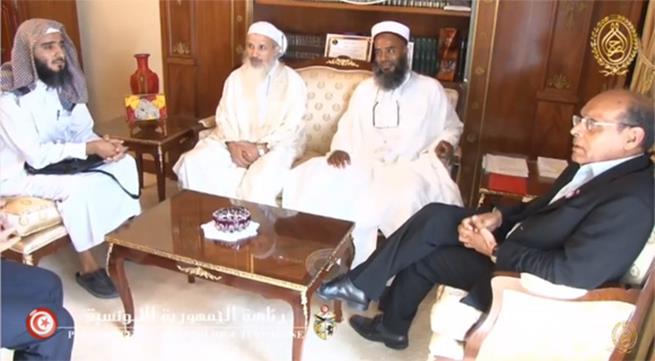 On October 11, 2012, at Carthage Palace, Marzouki received a delegation of Salafi sheikhs, including Salafi-jihadi preacher Imed Ben Salah, aka Sheikh Abou Abdallah Ettounsi; six months later, in March 2013, Ben Salah was arrested in Egypt and deported for falsifying travel papers for jihadists.[31]  Marzouki at Carthage Palace with members of the League for the Protection of the Revolution, considered a paramilitary movement close to El-Nahda.[32]  "Independence Day: Marzouki pardons prisoners" Cartoonist: _Z_ In the cartoon, Marzouki frees members of the League for Protection of the Revolution (LPR), which the Tunisian opposition considers to be El-Nahda's paramilitary armed wing, but leaves behind prisoners of conscience. Sign above the prisoner of conscience, "Jabeur Majri, attention!" refers to a Tunisian citizen sentenced in March 2012 to seven and a half years for "transgressing morality, defamation and disrupting public order" for posting cartoons of a naked Muhammad on Facebook.[33] "We launch a call to all Tunisians, men and women, residing in France who are concerned about the wave of violence in our beloved motherland and who feel that their honor has been violated to participate en masse in the rally to be held in front of the Institut du Monde Arabe, on the occasion of the conference which will be attended by Moncef Marzouki." El-Nahda Member Leads CpR On March 31, 2013, the National Council of the Congress for the Republic (CpR) Party unanimously appointed Presidential Chief of Staff Imed Daimi as the party's secretary-general, to replace Mohamed Abbou, who was resigning. A short time later, in April, Daimi announced that he had submitted his resignation to Marzouki. Daimi's appointment as CpR secretary-general was criticized by the liberal Tunisian media; Kapitalis[34] published an article by journalist Imed Bahri stating that the party had become a branch of El-Nahda, because, he said, Daimi is a militant of the Islamist movement. Bahri wrote: "The masks came off, because the comedy lasted for too long: The Congress for the Republic (CpR) [party], the so-called 'secular' branch of El-Nahda, chose a leader from El-Nahda. "Imed Daïmi was appointed... to the post of CpR secretary-general, to take the reins of CpR, at the conclusion of the party's Third Council.  Imed Daïmi[35] "Imed, as many of us know, is an Islamist and a former El-Nahda militant, who fled Tunisia soon after [Ben] Ali's takeover [in October 1987] and who later infiltrated the CpR, when it was created in 2000. At that time, El-Nahda was on the run, and its leaders were in prison or exiled; therefore, it adopted a policy of entryism. Consequently, some of its members joined the CpR. 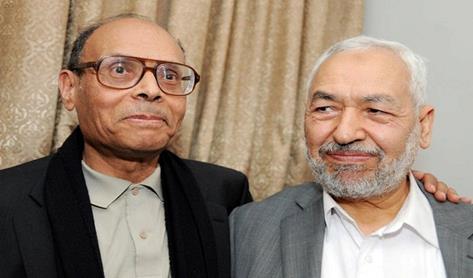 Marzouki with El-Nahda leader Rashed Ghannouchi[36] "The masks really did come off, and the CpR, in preparation for the next election, finally enters 'Beït Ettaâ,' or the house of submission to El-Nahda. It will go down in history that Imed Daïmi was the first political leader to allow Salafi Wahhabi preachers into Carthage Palace..." 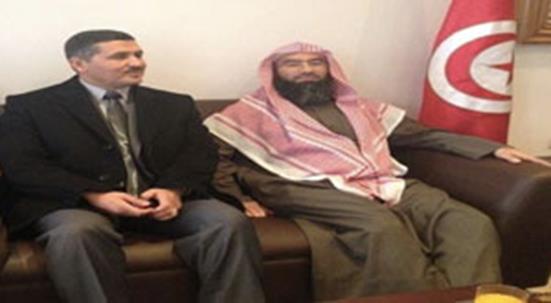 Imed Daïmi and Kuwaiti Salafi-Wahhabi preacher Nabil Al-Awadi, during a Tunisia visit by the latter; Daïmi personally welcomed Al-Awadi at the airport.[37] * Anna Mahjar-Barducci is a research fellow at MEMRI.
Endnotes:
[1] Profile photo from Marzouki’s official Facebook page, accessed May 2, 2013.
[2]
Marzouki's speech was at a ceremony in which Tunisia received $28.8
million in funds illicitly hidden by former president Zine Al-Abidine
Ben Ali and his family. After thanking the UN for assisting in the asset
recovery, Marzouki thanked Qatar, which he said "paid money to retrieve
this portion of Ben Ali’s assets." Middle East Online, April 13, 2013.
[3] Tekiano.com, April 12, 2013.
[4] Facebook.com/events/295924353874407/
[5] Middle East Online, April 13, 2013.
[6] Photo:Thierry Brésillon, January 13, 2012.
[7]
The Wafa movement was founded by Abderraouf Ayadi, former secretary
general of the Congress for the Republic party (Marzouki’s party).
[8] All Africa, April 17, 2013.
[10]
The Assassination of Tunisian Political Leader Chokri Belaid; Tunisian
Media: Government Bears Political Responsibility For Assassination;
Inquiry & Analysis Series Report No.932; February 13, 2013; http://www.memri.org/report/en/0/0/0/0/254/0/6997.htm
[11] http://www.youtube.com/watch?v=0UGwN1GP0JY, March 16, 2013.
[12] Arabs Today, April 2, 2013.
[13] Kapitalis (Tunisia), March 26, 2013.
[14]
Zaballah is the nickname given by _Z_ to Ghannouchi. Zaballah is formed
from "ZABA," the acronym of dictator Zine Al-Abidine Ben Ali, and
"Allah."
[15] http://www.debatunisie.com/, March 31, 2013.
[16] Middle East Online, April 1, 2013.
[17] Business News, April 24, 2013.
[18] Delta News (Tunisia), April 24, 2013.
[19] Facebook page of Editions la mauvaise découverte, April 13, 2013. The e-book is available for download here.
[20]
On February 7, Chokri Belaid’s brother Abdelmajid stated on the French
channel France 24 that the government’s representatives were persona non
grata at the funeral.
[21] See MEMRI Special Dispatch No. 5168, Tunisian President Moncef Marzouki Justifies Constitution: It Is a Compromise with the Islamists, February 14, 2013.
[22] Debatunisie, March 31, 2013.
[23] Tunisia Live (Tunisia), April 15, 2013.
[24] Demotix, April 12, 2013.
[25]
"Amina Tyler," a Tunisian activist in the Ukraine-based feminist group
FEMEN scandalized her country with her topless Facebook postings.
According to media reports, because of these Facebook posts, she was
kidnapped by her family, who beat her and held her captive for three
weeks.
[26] Tunisia Live (Tunisia), April 15, 2013.
[27] Kapitalis (Tunisia), April 8, 2013.
[28] Kapitalis (Tunisia), April 8, 2013.
[29]
Tunis Tribune Facebook page, April 12, 2013. The secular opposition
considers the Troika politically responsible for the assassination of
Chokri Belaid; see also MEMRI Inquiry and Analysis No. 932, The
Assassination of Tunisian Political Leader Chokri Belaid; Tunisian
Media: Government Bears Political Responsibility For Assassination, February 13, 2013.
[30] Demotix, April 12, 2013.
[31] Kapitalis, March 22, 2013.
[32] Tunis Tribune (Tunisia), January 12, 2013.
[33] Debatunisie, March 21, 2013.
[34] Kapitalis (Tunisia), March 31, 2013.
[35] TAP (Tunisia), March 12, 2013.
[36] L’Economiste Maghrebin, December 18, 2012.
[37] Kapitalis (Tunisia), January 27, 2013.
|
An attempt is made to share the truth regarding issues concerning Israel and her right to exist as a Jewish nation. This blog has expanded to present information about radical Islam and its potential impact upon Israel and the West. Yes, I do mix in a bit of opinion from time to time.
Thursday, May 30, 2013
Tunisian Interim President Moncef Marzouki -- 'The Invention Of A President, The Illusion Of A Democracy'
Subscribe to:
Post Comments (Atom)
No comments:
Post a Comment